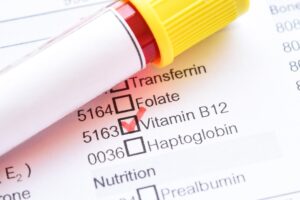What is vitamin B-12?
Vitamin B-12 can be taken in the form of injections. Vitamin B-12 is an essential water-soluble vitamin that plays an important role in many functions in the body, including:
- DNA synthesis
- Energy production
- Nerve cell health
- Red blood cell formation
- Neurological function
B-12 is present in many food sources (mainly animal-based), where it is bound to the protein molecules in that food. Vitamin B-12 is separated from the protein during digestion and is absorbed into the bloodstream. Adequate stomach acid is required to release the vitamin from the protein, and a substance called intrinsic factor is necessary to ensure its absorption. People who are unable to absorb vitamin B-12 properly may have pernicious anemia, which is a type of anemia characterized by a lack of intrinsic factor.
Who needs B-12 shots?
While B-12 supplements and foods fortified with the vitamin are readily available, vitamin B-12 shots are only available by prescription, so a clinical diagnosis is always necessary. t is important to note that low levels are rare in most healthy adults because the human liver stores several years’ worth of vitamin B-12. However, some groups of people are more at risk of deficiency than others and may wish to discuss the possibility of B-12 shots with their doctor.
People with signs and symptoms of B-12 deficiency
Anyone who is displaying any of the signs and symptoms of a B-12 deficiency or pernicious anemia should consult their doctor immediately. Some common signs and symptoms include:
- Decreased cognitive function, such as issues with memory or understanding
- Fatigue
- Lethargy
- Constipation
- Feeling faint
- Depression or irritability
- Headache
- Difficulty maintaining balance
- Sore, swollen tongue, which may be pale yellow or very red
- Heart palpitations
- Mouth ulcers
- Par anesthesia (pins and needles)
- Vision changes
B-12 deficiency risk factors
Both diabetes and some medications for type 2 diabetes can increase the risk of vitamin B-12 deficiency. Also, the following risk factors can increase the chance of developing vitamin B-12 deficiency:
- Alcohol abuse
- Smoking
- Certain prescription medications, including antacids and some type 2 diabetes drugs
- Having an endocrine-related autoimmune disorder, such as diabetes or a thyroid disorder
- Eating a vegetarian or vegan diet
- Certain gastrointestinal disorders, such as crohns disease
- Gastric bypass or the removal of parts of the stomach
- Aging
Benefits of B-12 Shots
There are several reasons to consider getting a B-12 shot, including:
Reduced risk of vitamin B-12 deficiency and associated complications
The most obvious benefit of receiving vitamin B-12 shots is treating a vitamin B-12 deficiency and avoiding its associated symptoms.
In addition, B-12 shots reduce the risk of some serious complications associated with vitamin B-12 deficiency including:
- Heart disease
- Neurocognitive disorders
- Coordination problems (ataxia)
- Peripheral nephropathy
- Vision loss
- Infertility (although this usually resolves with B-12 treatment)
- Neural tube defects in the babies of women with B-12 deficiency.
High levels of assimilation by the body
B-12 shots bypass the stomach and are absorbed directly into the bloodstream. Therefore, they are a better option than oral supplements for those who have gastrointestinal issues, including older adults who have low levels of stomach acid or intrinsic factor.
Call us Today
If you would like to learn more information about b-12 shots, contact our office at 303-955-7545 today!
